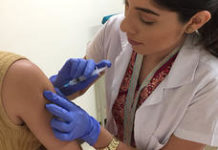On 20 August 2020, the US Food and Drug Administration (FDA) approved carfilzomib (KYPROLIS, Onyx Pharmaceuticals, Inc.) and daratumumab (DARZALEX, Janssen Biotech, Inc.) in combination with dexamethasone for adult patients with relapsed or refractory multiple myeloma who have received one to three lines of therapy.
The efficacy of carfilzomib and daratumumab with dexamethasone was evaluated in two clinical trials, CANDOR and EQUULEUS.
CANDOR (NCT03158688) was a randomised, open label, multicentre trial evaluating the combination of carfilzomib (20/56 mg/m2 twice weekly regimen) with intravenous daratumumab and dexamethasone (DKd) versus carfilzomib (20/56 mg/m2 twice weekly regimen) and dexamethasone (Kd) in patients with relapsed or refractory multiple myeloma who had received 1 to 3 prior lines of therapy. A total of 466 patients were randomised; 312 to the DKd arm and 154 to the Kd arm.
Efficacy was assessed by an independent review committee (IRC) evaluation of progression-free survival (PFS) using International Myeloma Working Group (IMWG) response criteria. Median PFS was not reached for the DKd arm and was 15.8 months (95% confidence interval [CI] 12.1, not estimable) for the Kd arm (hazard ratio 0.63; 95% CI 0.46, 0.85; 1-sided p-value 0.0014).
EQUULEUS (NCT01998971) was an open label, multicohort trial evaluating the combination of carfilzomib (20/70 mg/m2 once weekly regimen) with intravenous daratumumab and dexamethasone (DKd). Efficacy was based on overall response rate (ORR) as assessed by IRC using IMWG response criteria. Of the 85 patients with relapsed or refractory multiple myeloma who had received 1 to 3 prior lines of therapy enrolled in the DKd cohort, the ORR was 81% (95% CI 71, 89) with a duration of response of 27.5 months (20.5, not estimable).
The most common adverse reactions occurring in at least 20% of patients treated with carfilzomib and daratumumab in the combination therapy trials were infusion related reactions, anaemia, diarrhoea, fatigue, hypertension, pyrexia, respiratory tract infection, thrombocytopenia, neutropenia, lymphopenia, cough, dyspnoea, insomnia, headache and back pain.
The recommended dosage regimens of carfilzomib, when administered in combination with intravenous daratumumab and dexamethasone, are:
- Once weekly 20/70 mg/m2 regimen: administer carfilzomib intravenously as a 30-minute infusion on days 1, 8, and 15 of each 28-day cycle at a dose of 20 mg/m2 on cycle 1 day 1 and, if tolerated, increased to 70 mg/m2 on cycle 1 day 8 and thereafter OR
- Twice weekly 20/56 mg/m2 regimen: administer carfilzomib intravenously as a 30-minute infusion on days 1, 2, 8, 9, 15, and 16 of each 28-day cycle at a dose of 20 mg/m2 on days 1 and 2 of cycle 1 and, if tolerated, increased to 56 mg/m2 on cycle 1 day 8 and thereafter.
The recommended dosage regimen of intravenous daratumumab, when administered in combination with carfilzomib and dexamethasone, is 16 mg/kg actual body weight administered as split dosing of 8 mg/kg on days 1 and 2 of cycle 1, followed by standard dosing of 16 mg/kg for subsequent doses administered weekly from weeks 2 to 8, every two weeks from weeks 9 to 24, and every four weeks from week 25 and thereafter.
Full prescribing information for KYPROLIS is available here and for DARZALEX here.
This review used the Assessment Aid, a voluntary submission from the applicants to facilitate the FDA’s assessment. The FDA approved the carfilzomib and daratumumab applications 3 and 4 months ahead of the FDA goal dates, respectively.
Healthcare professionals should report all serious adverse events suspected to be associated with the use of any medicine and device to FDA’s MedWatch Reporting System.
For assistance with single-patient INDs for investigational oncology products, healthcare professionals may contact FDA’s Oncology Center of Excellence Project Facilitate.








